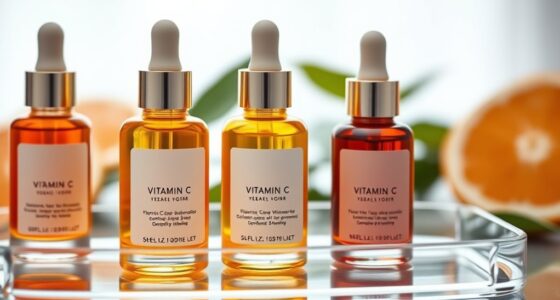Exosomes are tiny vesicles that help your skin heal and rejuvenate by delivering proteins, nucleic acids, and lipids to skin cells. Scientific evidence shows they can boost collagen, improve elasticity, and reduce signs of aging. They activate dormant skin cells, promoting regeneration and a more youthful appearance. While research is promising, quality and source matter. Discover more about how exosomes might transform your skincare routine and support skin health.
Key Takeaways
- Scientific studies indicate exosomes promote skin regeneration, improve texture, tone, and elasticity, and may reverse aging signs.
- Exosomes act as cellular messengers, stimulating collagen and elastin production for youthful skin.
- Clinical evidence supports their role in enhancing skin repair and reducing inflammation.
- High-quality, well-characterized exosome products are essential for safety and efficacy.
- Research is ongoing, and standardized protocols for exosome skincare treatments are still developing.

Exosomes are emerging as a powerful ingredient in skincare, promising to revolutionize the way we approach skin rejuvenation and repair. These tiny vesicles, naturally produced by cells, are packed with bioactive molecules like proteins, lipids, and nucleic acids that facilitate cellular communication. When applied topically or used in treatments, they can transfer essential signals between cells, encouraging the skin’s natural healing processes. This ability to enhance cellular communication makes exosomes particularly appealing in the field of regenerative medicine, where restoring damaged tissues and promoting skin health are top priorities. Furthermore, ongoing research highlights their potential to integrate with emerging AI-driven technologies, which could optimize personalized skincare treatments in the future.
Exosomes boost skin healing by delivering vital signals, revolutionizing regenerative skincare and promoting natural rejuvenation.
In regenerative medicine, exosomes serve as messengers that deliver regenerative signals directly to skin cells. Unlike traditional skincare ingredients that only sit on the surface, exosomes penetrate deeper, influencing cellular behavior at a fundamental level. They can stimulate collagen and elastin production, boost cell proliferation, and reduce inflammation—all critical factors in reversing signs of aging and improving overall skin quality. Because they harness the body’s natural regenerative pathways, exosomes offer a more targeted and potentially more effective approach to skin rejuvenation than conventional topical agents.
Research supports their potential, showing that exosomes can markedly improve skin texture, tone, and elasticity. They work by activating dormant or damaged cells, encouraging them to regenerate and restore skin’s youthful appearance. This process aligns with regenerative medicine principles, as it focuses on harnessing the body’s inherent capacity to heal itself. As you explore treatments with exosomes, you’re tapping into this cutting-edge science that emphasizes restoring your skin’s health from within, rather than merely covering up imperfections.
While the clinical evidence is promising, it’s important to recognize that research is still ongoing. Most studies highlight exosomes’ ability to promote skin regeneration and repair, but standardized protocols for their use in skincare are still being developed. As a consumer, you should be cautious and seek out reputable providers who use well-characterized, high-quality exosome products. Look for treatments that specify the source of the exosomes, their purification process, and evidence of safety and efficacy.
Frequently Asked Questions
Are Exosomes Suitable for All Skin Types?
Exosomes can suit most skin types, but skin compatibility varies. If you have sensitive skin or ingredient sensitivity, it’s wise to patch test first, as some may react to the active components. While many find exosome treatments beneficial for skin renewal and anti-aging, monitoring your skin’s response is essential. Consult with a dermatologist to guarantee exosomes are safe for your specific skin type before full application.
How Long Do Skincare Benefits From Exosomes Last?
The skincare benefits from exosomes typically last around 4 to 6 weeks, but this duration varies based on factors like your skin type, age, and skincare routine. Longevity factors include how well you maintain a consistent regimen, sun protection, and overall skin health. To maximize results, follow your dermatologist’s advice and consider periodic treatments, as the effects gradually diminish without ongoing care.
Can Exosomes Cause Allergic Reactions or Sensitivities?
Think of your immune response as a vigilant gatekeeper. Exosomes, like tiny messengers, can sometimes trigger allergic sensitivities if your immune system perceives them as threats. While rare, some individuals may experience allergic reactions or sensitivities to skincare containing exosomes. It’s essential to patch-test first and monitor your skin’s response. If you notice irritation, consult a dermatologist to make certain your immune response stays balanced and your skin stays safe.
Are Exosome Treatments Safe for Pregnant Women?
Exosome treatments aren’t recommended for pregnant women because their pregnancy safety isn’t well established, and there’s concern about potential impacts on fetal development. You should consult your healthcare provider before considering any new skincare, especially during pregnancy. While exosomes may offer benefits, the lack of conclusive research on fetal impact makes it safer to avoid these treatments until more information is available. Prioritize safety for both you and your baby.
How Do Exosomes Compare to Other Skincare Ingredients?
You’ll find that exosomes in skincare offer unique regenerative benefits, unlike traditional ingredients like hyaluronic acid or retinol. However, they face regulatory challenges, making their safety and efficacy less established. Plus, exosome treatments tend to be more expensive due to complex manufacturing processes. While promising, you should weigh these factors against other ingredients, considering your budget and comfort with newer, less regulated options.
Conclusion
As you explore the world of exosomes in skincare, imagine them as tiny messengers weaving a delicate tapestry of renewal on your skin’s surface. While the evidence is still blossoming, these microscopic couriers hold the promise of awakening your skin’s youthful glow, like morning dew reviving wilted petals. Stay curious and cautious, for as nature’s whisperers, exosomes may soon reveal a new chapter in your skincare journey—where science and beauty dance in harmony.









